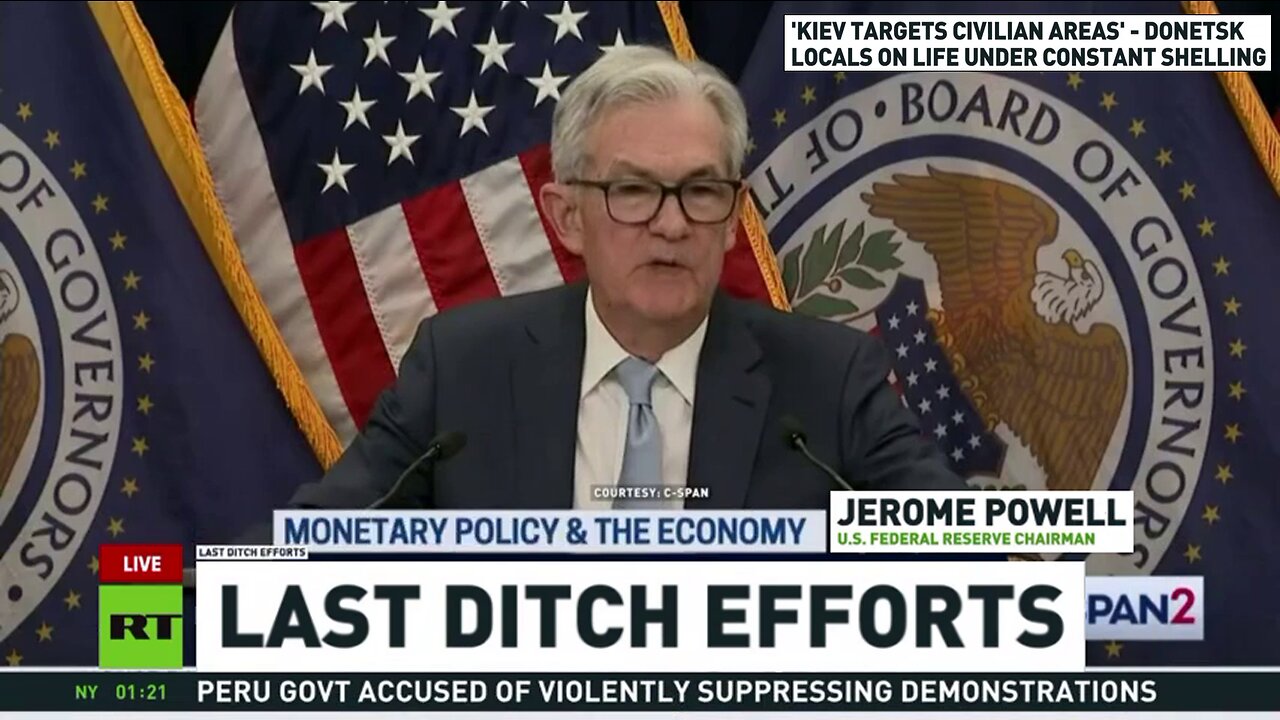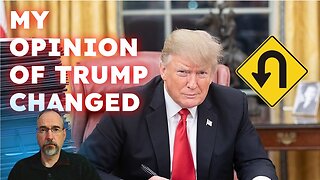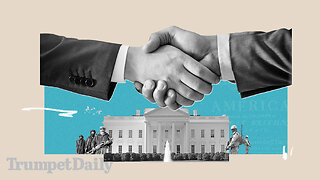Premium Only Content

RT News - December 17th 2022
In Donetsk, continued shelling of residential buildings in civilian on areas has continued on Friday and overnight. Casualty list is at yet known. RT speaks to some of the residents and Denis Pushilin, head of the Donetsk Republic, who is worried about escalations from the west and NATO
In the latest act of censorship against media, the EU targets RT's parent company with another round of sanctions, ordering a freeze of the company's assets in Europe. This is part of the 9th set of sanctions against Russia. These sanctions affect people even associated with the company
The United Nations has condemned a terror attack on Russia's humanitarian offices in the Central African Republic where the head of mission was seriously wounded.
US has supplied drones to Ukraine which have hit targets deep into Russia.
Inflation in USA - last ditch efforts have seen the markets shocked since the announcement of new higher interest rates from the FED
Shocking footage of the demonstrations in Peru where it appears that the military are shooting protestors from military helicopters. Please refer back to previous posts for more detail. Report from RT and Ben Norton
=======================================
Below: Feature, Is nuclear war between Russia and the US possible?
Updates on Twitter scandals
===========================================
16 Dec, 2022 19:40
‘Who will blink first?’ Is nuclear war between Russia and the US possible?
Some believe the stand off between Moscow and Washington could eventually see atomic weapons used
Discussions about strengthening nuclear arms control have been ongoing for decades, but have recently receded into the background, with leading powers now hurling direct threats at each other.
Despite the obvious catastrophic consequences of a nuclear war, in which world leaders have repeatedly noted there would be no winners, Moscow and Washington continue to warn that they are ready to use their arsenals in extreme circumstances.
Experts have expressed hope that these statements are nothing more than attempts at blackmail. However, sooner or later, this kind of talk could lead to a critical situation similar to the height of the Cuban Missile Crisis, when the Soviet Union and United States held atomic pistols to each other’s heads.
To make matters worse, the entire system of international agreements on disarmament has practically collapsed, leaving little hope for improvement in the near future.
Putin’s appeals did not help
In the first year of his presidency, back in 2000, Vladimir Putin proposed that Russia and the US radically reduce nuclear warhead levels – to 1,500 units. He noted that it would be realistic to accomplish this by 2008, and that it should have been possible to shrink the arsenals of both countries even further in the future.
Russia, according to Putin, did not see any obstacles to more reductions in strategic offensive weapons.
“But the main thing now is for Russia and the United States to start moving together or in parallel to radically lower ceilings on nuclear warheads without delay,” the president said.
Putin’s proposal was never heeded and twenty two years have passed. According to the Stockholm International Peace Research Institute (SIPRI), as of the beginning of 2022, the US had the world’s largest arsenal of nuclear weapons on alert – 1,774 'deployed' warheads placed on missiles or located on bases of operational forces. The US boasts a fully-fledged nuclear triad that includes air, land, and sea components.
Russia has only 1,588 deployed warheads but has a larger total inventory than Washington - 5,977 to 5,428, according to the Federation of American Scientists (FAS).
Other nuclear states certainly have far fewer warheads at their disposal. France, according to the SIPRI, has 290 warheads (10 deployed), and the UK has 225 as of 2022 (60 deployed).
Little is known about the Chinese nuclear arsenal though it is believed that at the beginning of this year, it numbered over 350 warheads. A report by the Federation of American Scientists concludes that Beijing's stockpile is increasing.
Be that as it may, the main tension in the nuclear club today is between the US and Russia. Many consider the situation to be volatile, especially considering the increasingly combative statements coming from Moscow and Washington.
The situation heats up
In light of the conflict in Ukraine, public concern about the possibility of a global nuclear conflict is on the rise. This was first actively discussed on February 27, when Putin ordered the Russian deterrent forces to be put on special combat alert. The Strategic Deterrence Forces are the basis of the Russian Armed Forces' combat power, intended to deter aggression against Russia and its allies, as well as defeat an aggressor, including in a war with the use of nuclear weapons.
It is important to note that Moscow has repeatedly stated that the country’s nuclear doctrine does not imply preventive strikes, confirmed by the president himself. That is, nuclear weapons would only be used if an aggressor launches a nuclear attack on Russian territory, or if the very existence of the state was under threat due to a conventional assault.
Analysts have repeatedly returned to the question of whether a real nuclear confrontation between Russia and other states armed with atomic bombs is possible. In August, then-British Foreign Minister and PM candidate Liz Truss said she would use nuclear weapons if necessary. Prior to that, US Secretary of State Antony Blinken said that Washington would consider using its nuclear arsenal only in emergency circumstances, such as to protect the vital interests of the US, its allies, and partners.
Talk of a possible nuclear conflict re-emerged on September 21, when Putin said that Russia would use all means at its disposal if faced with a threat to its territorial integrity. He pointed to the fact that Washington is directly pushing Kiev to expand the hostilities to Russian territory. Putin also noted that Western countries openly state that Russia should be defeated on the battlefield by all means, and deprived of economic, political, cultural, and in general, any, sovereignty.
According to the president, western powers are using nuclear blackmail, pointing to statements by high-ranking representatives of leading NATO states about the possibility and permissibility of using weapons of mass destruction against Russia.
“I want to remind those who permit themselves to make such statements concerning Russia: Our country also has various weapons of destruction at its disposal, and in certain components, more modern than those of NATO countries. If the territorial integrity of our country is threatened, we will certainly use all the means at our disposal to protect Russia and our people. This is not a bluff,” Putin said.
Following that, US National Security Advisor Jake Sullivan said in an interview with CBS that Washington would respond to Moscow on the possible use of nuclear weapons. He noted that the White House had warned Russia about the catastrophic consequences of using such weapons.
On October 7, Ukrainian President Vladimir Zelensky called on NATO to launch pre-emptive strikes on Russian territory, a statement that clearly did little to improve the situation. However, the very next day, he denied that he meant the use of nuclear weapons. As the Ukrainian leader explained, he was talking about new sanctions by Western countries to prevent nuclear war.
Later, Zelensky repeatedly expressed his belief that Putin would not use nuclear weapons in the Ukraine conflict.
Putin himself said on October 27 that Russia has no need to launch a nuclear strike on Ukraine, since there is no political or military sense in doing so. He once again pointed to Russia’s nuclear doctrine, which describes the cases in which nuclear weapons may be used.
Is the use of nuclear weapons possible?
Political analysts consider the actual use of nuclear weapons by the US or Russia unlikely or even practically impossible. Konstantin Blokhin, a leading researcher at the Center for Security Studies of the Russian Academy of Sciences, dismissed statements about the possibility of a nuclear strike on Russia as instruments of informational and psychological pressure - blackmail by the US against Russia. Its main purpose, he contends, is to send Russia a clear signal that if it does not stop its special military operation, a third world war – this time nuclear – will begin.
But if this war happens, it will be the last in the history of mankind, civilization will roll back to the Stone Age.
“The United States has got something to lose. Everyone has got something to lose. They will not start any war, and definitely not because of Ukraine. Ukraine is an instrument of deterrence, a hotbed of tension at our borders, nothing more. This is all a bluff,” Blokhin told RT.
He drew a parallel with the Star Wars program, which was developed under former US President Ronald Reagan and provided for the creation of an extensive defense system that integrated laser-armed satellites, air and ground-based anti-ballistic missile systems, and electromagnetic railguns. Its main goal was to intercept intercontinental ballistic missiles launched by the USSR or other potential adversaries.
Washington hoped that the realization that the vast majority of warheads launched towards the US would be destroyed would force the USSR to accept the fact that a nuclear confrontation would be hopeless.
“In those times, things were very much the same as now. But back then, we believed it. And now, the goal is to scare us so that Russia will stop its actions. Therefore, we should consider this calmly. No one will start a nuclear war because of Ukraine,” Blokhin said.
He also compared what is happening today to the Cuban Missile Crisis, but noted that in the 1960s, the confrontation was more acute.
“Ukraine is a faraway country for the United States, while Cuba is close. It was Khrushchev’s revolver pointed at Kennedy’s head. And humanity was on the verge. Today, there is no question of any parallel,” he said.
According to Vladimir Vasiliev, a senior researcher at the Institute for US and Canadian Studies at the Russian Academy of Sciences, it would be premature and rash to openly raise the issue of using nuclear weapons. The main question is the likelihood of using nuclear weapons along the lines of the Cuban Missile Crisis.
According to Vasiliev, America’s hopes that Russia’s military operation would play out in favor of Kiev and the collective West, and that the billions of dollars in aid sent to Ukraine would lead to a strategic defeat for Russia, have not been justified.
“In this respect, the question of a relative calm or even paralysis arises. Perhaps the West expects that in the near future, it will be able to escalate tensions, and that this may eventually spin out of control. And when that happens, the threat of using nuclear weapons would be the last resort,” he told RT, adding that the West will resort to this threat if it considers Russia’s winter campaign in Ukraine successful.
Vasiliev noted that it is difficult to say exactly how the West will be provoked into this, but perhaps the issue of putting the world on the brink of a nuclear conflict and moving the conflict into a certain qualitative phase, forcing Russia to retreat, is being discussed now.
He pointed out that since February 24, when the military assault began, there has been no cardinal shift in the conflict. Now, however, the scope for supplying Ukraine with military equipment is dwindling, the infrastructure of the Ukrainian economy is being destroyed, and the conflict is becoming hybrid, so “an attempt by the West to grab a nuclear pistol is very likely.
“The West can put the world on the brink of a global conflict, to see who blinks first, and use this fact to create elements of a strategic turning point in the course of the special military operation in Ukraine. Perhaps the West is really considering such plans today due to rather complicated economic considerations,” Vasiliev said.
No disarmament in sight
In light of current events, many are going back to Putin’s speech at the Munich Security Conference in 2007, where he raised the topic of disarmament, a subject still relevant today.
“No one feels safe! Because no one can hide behind international law as behind a stone wall. Such a policy is, of course, a catalyst for an arms race... The potential danger of destabilizing international relations is linked to the obvious stagnation in the field of disarmament,” the Russian president said in Munich.
Over 15 years have passed but Putin’s statement has, if anything, only become more relevant. Since then, much has transpired: the Open Skies Treaty and the INF Treaty on the elimination of intermediate-range and shorter-range missiles have been terminated, and in general, as many experts believe, the entire system of international agreements on disarmament is collapsing.
After the termination of the INF Treaty, only one bilateral arms control treaty between the US and Russia remains – the Treaty on Measures for the Further Reduction and Limitation of Strategic Offensive Arms (New START), which is in effect until 2026.
“Its execution is still frozen because there is no trust between the United States and Russia, there is no transparency, consultations. I think there will be no disarmament in our lifetime. New START will be extended, but no new document will be signed,” Blokhin said.
Vasiliev isn’t any more optimistic and also believes that there are no prospects for nuclear disarmament. He noted that the system of international agreements is complex, but today the whole mechanism has been destroyed, and countries have no incentive to deal with the problem unilaterally.
“As a rule, they are unilaterally engaged in the modernization of their nuclear forces. From the point of view of the possibility of a nuclear conflict, today there is no point in talking about disarmament,” he said.
By Lidia Misnik, a Moscow-based reporter focused on politics, sociology and international relations
https://www.rt.com/news/568109-who-will-blink-first/
===========================================
17 Dec, 2022 03:18
Twitter docs reveal FBI pressure to control speech
Federal officials repeatedly flagged specific users and posts they wanted scrubbed from the social media platform
Twitter has maintained “constant and pervasive” contacts with the FBI and other US intelligence agencies for several years, according to internal company documents leaked to reporters. The files appear to show a concerted government campaign to blacklist content labeled as “misinformation.”
Published by journalist Matt Taibbi on Friday, the sixth installment of the ‘Twitter Files’ revealed additional pressure placed on the website by the FBI and the Department of Homeland Security (DHS) between January 2020 and as recently as last month, largely focused on moderating particular posts and accounts discussing American elections.
While earlier documents indicated high-level coordination between intelligence agencies and Twitter, the latest files suggest such collusion took place on a larger scale than was previously known. In a period of less than three years, the company's former Trust and Safety chief Yoel Roth alone exchanged more than 150 emails with the FBI.
Prior to Friday, Roth was the only executive said to have had regular, direct contacts with the bureau, however the new files show that legal exec Stacia Cardille also held weekly meetings with not only the FBI, but the DHS, Department of Justice (DOJ) and the Office of the Director of National Intelligence (ODNI) beginning in September.
In a letter addressed to Twitter’s former Deputy General Counsel Jim Baker – himself an ex-lawyer for the FBI – Cardille noted that she asked whether there would be “impediments” to passing along classified information to industry partners. In response, the FBI was “adamant” that there were “no impediments to sharing.”
“This passage underscores the unique one-big-happy-family vibe between Twitter and the FBI. With what other firm would the FBI blithely agree to ‘no impediments’ to classified information?” Taibbi asked.
A number of messages sent to Twitter by the FBI contain explicit requests to take down certain posts, or even ban accounts altogether. In one case, the agency flagged so much “possible violative content” that Twitter staffers were later seen congratulating each other in an internal company chat for the “monumental undertaking” of reviewing it.
Another message sent on November 5, 2022 from the FBI’s ‘National Election Command Post’ provided a list of 25 accounts that “may warrant additional action.” Twitter was quick to permanently ban seven of those handles, while it temporarily suspended another and deleted eight tweets for alleged “civil misinformation policy violations.”
Much of the flagged content detailed in the latest documents pertained to the midterm elections in November, including posts from ‘Claire Foster PhD,’ a well-known satire account which regularly mocks progressives. ‘Foster’ was reported by the FBI after joking that she was a ballot counter in her state, and that she would add “another vote for the Democrats” for every “negative comment” left on her tweet.
“Anyone who cannot discern obvious satire from reality has no place making decisions for others or working for the feds,” ‘Foster’ told Taibbi when informed about the flagging.
Though the parody account was ultimately spared, many others were not as fortunate, with separate documents showing several cases in which Twitter gave in to take-down requests from the FBI and DHS, as well as a network of partnered contractors and NGOs.
Spearheaded by Taibbi and fellow reporter Bari Weiss, the Twitter Files have been published on a rolling basis with the blessing of the site’s new owner, billionaire entrepreneur Elon Musk. To date the documents have shed light on several controversial decisions made by the company, including material surrounding the suspension of ex-President Donald Trump, the practice of shadow banning, as well as a site-wide ban on a New York Post report about the foreign business dealings of Hunter Biden, the son of President Joe Biden.
https://www.rt.com/news/568402-twitter-files-fbi-censorship/
================================
16 Dec, 2022 13:52
EU threatens Elon Musk with sanctions
The billionaire and his platform could face punishment for violating media freedom rights, the bloc warns
The EU has warned Elon Musk that Twitter could be targeted by sanctions after the platform owned by the entrepreneur suspended several journalists for allegedly sharing real-time location data about the billionaire and his family.
“News about arbitrary suspension of journalists on Twitter is worrying,” wrote EU Commissioner for Values and Transparency Vera Jourova in a tweet on Friday. “EU’s Digital Services Act requires respect of media freedom and fundamental rights,” she said, adding that these rights are reinforced under the recently adopted European Media Freedom Act.
“[Elon Musk] should be aware of that. There are red lines. And sanctions, soon,” Jourova warned, as the Digital Services Act is set to start coming into force next summer and will be fully implemented by 2024.
Her threats come after Twitter suspended around half-a-dozen journalists on Thursday who reported and shared links to the @ElonJet handle, which provided real-time tracking of Musk’s personal flights.
Musk has explained the decision by stating that the information being shared was “basically assassination coordinates” and pointed to Twitter's terms of service, which prohibit doxxing – the illegal publishing of personal information – of anyone by anyone. “Same doxxing rules apply to ‘journalists’ as to everyone else,” the billionaire wrote on Thursday.
Twitter has previously suspended the original @elonjet account, as well as other similar flight-tracking channels owned by Florida student Jack Sweeney, who had been posting real-time data on private flights of the world’s wealthiest men, including Musk, Amazon CEO Jeff Bezos, Meta CEO Mark Zuckerberg and Microsoft founder Bill Gates.
Musk – a self-proclaimed “free speech absolutist” – purchased Twitter for $44 billion in late October. Back then he initially promised not to suspend any accounts that were exercising free speech, noting that that extended “even to not banning the account following my plane, even though that is a direct personal safety risk.”
https://www.rt.com/news/568376-eu-musk-twitter-sanctions/
==================================================
3 Dec, 2022 17:22
Musk’s Twitter files: What have we learned from the Hunter Biden laptop story?
Leaked files outlined a company-wide effort to suppress a damaging report about Joe Biden’s family
Some of Twitter’s highest-ranking staff blocked the spread of the Hunter Biden laptop story in 2020, even as they struggled to explain why, documents released on Friday by new CEO Elon Musk and journalist Matt Taibbi reveal. RT examines what’s in these files, as well how the scanned unfolded.
What happened to Hunter Biden’s laptop?
On October 14, 2020, the New York Post published the first in a series of articles based on information obtained from Hunter Biden’s laptop. These articles implicated Joe Biden in numerous pay-to-play schemes involving his son’s foreign business contacts – and coming weeks before the presidential election, threatened to sink Biden’s campaign against then-President Donald Trump.
Twitter immediately manipulated its algorithm to suppress the story, before banning links to it entirely, citing its “hacked materials” policy. Users were even forbidden from sharing the article via direct message, a move that Taibbi noted is usually reserved for “extreme cases” like child pornography. The New York Post had its account suspended for two weeks, and Trump’s account was temporarily locked for sharing a video that referenced the story.
The Biden campaign claimed that the laptop’s contents were fabricated by Russia, while most mainstream media outlets refused to cover the story. The contents of the laptop were subsequently declared authentic by the New York Times, Washington Post, and Daily Mail, long after Biden defeated Trump.
How was the story suppressed?
The decision to bury the story was spearheaded by Twitter’s former head of Legal, Policy and Trust, Vijaya Gadde, Taibbi reported.
Some staff were uncomfortable labeling the story as ‘hacked’, with communications official Trenton Kennedy writing “I’m struggling to understand the policy basis for marking this as unsafe,” and former Vice President of Global Communications Brandon Borrman wondering: “can we truthfully claim that this is part of the policy?”
“Hacking was the excuse, but within a few hours, pretty much everyone realized that wasn’t going to hold,” one former employee told Taibbi. “But no one had the guts to reverse it.”
Former trust and safety chief Yoel Roth explained that “given the SEVERE risks here and lessons of 2016, we’re erring on the side of including a warning and preventing this content from being amplified,” apparently referring to unproven claims of outside meddling in the 2016 election.
Did Twitter’s CEO know?
According to Taibbi, the decision to censor the story was made without the knowledge of then-CEO Jack Dorsey, who would later tell Republican lawmakers that he thought it was “wrong” to block links to the Post’s story.
Taibbi wrote that “there are multiple instances in the files” of Dorsey questioning the suspension of accounts from across the political spectrum.
Was the Biden campaign involved?
Despite “general” warnings from law enforcement about “possible foreign hacks” during the summer of 2020, Taibbi stated that the files show no evidence of any government involvement in the censorship of the laptop story.
It is unclear whether the Biden campaign highlighted the story for suppression, but the campaign did maintain contact with Twitter’s content moderators, who often deleted tweets at its request, internal communications posted by Taibbi show. “By 2020, requests from connected actors to delete tweets were routine,” he explained. “One executive would write to another: ‘More to review from the Biden team.’ The reply would come back: ‘Handled.’”
Why is this coming to light now?
Since purchasing Twitter for $44 billion in October, Musk has fired more than half of the platform’s staff, including Gadde, and set about rolling back some of the platform’s more odious speech restrictions. Musk reinstated the account of Trump, lifted Twitter’s ban on the sharing of ‘misinformation’ about Covid-19, and announced a “general amnesty” for previously suspended accounts.
Musk began the process of buying Twitter in April. In a response to reporter Saagar Enjeti that month, he said that “suspending the Twitter account of a major news organization for publishing a truthful story was obviously incredibly inappropriate,” referring to the New York Post’s reporting. In November, he wrote that releasing the files explaining the decision would be “necessary to restore public trust” in Twitter.
Musk has described himself as a “free speech absolutist,” and said that he acquired Twitter because “it is important to the future of civilization to have a common digital town square, where a wide range of beliefs can be debated in a healthy manner.”
https://www.rt.com/news/567614-musk-twitter-hunter-biden/
==============================================
Thread 6: https://twitter.com/mtaibbi/status/1603857534737072128
Matt Taibbi @mtaibbi 1. THREAD: The Twitter Files, Part Six
TWITTER, THE FBI SUBSIDIARY
==================================================
-
 9:00
9:00
The Art of Improvement
20 hours agoThe Habits of Highly Organised Individuals
20.7K1 -
 12:21
12:21
Professor Gerdes Explains #Ukraine
10 hours agoI Misjudged Trump! This Changes Everything!
13.6K23 -
 5:21
5:21
The Shannon Joy Show
16 hours ago☣️ Bioterror Attack Simulation — Are They Practicing for the Real Thing?
15.4K3 -
 52:48
52:48
The Hannah Faulkner Show
16 hours ago $0.42 earnedTHE TRUTH ABOUT BIG FERTILITY with Emma Waters | The Hannah Faulkner Show
15.6K1 -
 32:13
32:13
Uncommon Sense In Current Times
14 hours ago $0.26 earnedEXCLUSIVE: Antisemitism Is Spreading in America — Campuses to Congress | Rabbi Steve Weil Interview
14.2K9 -
 1:00:22
1:00:22
Trumpet Daily
20 hours ago $2.75 earnedPeace Derangement Syndrome - Trumpet Daily | May 20, 2025
14.1K9 -
 32:12
32:12
Steph & Kayls
17 hours ago $0.33 earnedUnfiltered Talks: Backdoor Adventures 🍑 & Dirty Requests | Ep. 6
14.1K4 -
 50:58
50:58
Lets Read!
1 day ago $1.95 earned3 More True Scary Private Investigator Stories
310K4 -
 2:55:43
2:55:43
TimcastIRL
11 hours agoIsrael Prepares To STRIKE Iran Nuclear Facilities Says US Intel | Timcast IRL
710K133 -
 1:28:53
1:28:53
Man in America
14 hours agoHow the Elites are Stripmining the Middle Class—So You'll OWN NOTHING w/ Tiffany Cianci
78.1K36